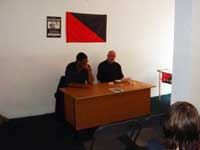Over 30 years of anarchist writing from Ireland listed under hundreds of topics
Talk
Successful Belfast anarchist bookfair
The 2ND Belfast Anarchist Bookfair recently took place building on the success of the previous year. Stalls were provided by the WSM, Choice Ireland, Just Books, Organise! and Revolutionary Anarcha-feminist group(RAG) as well as groups from as far as England and Scotland including Solidarity Federation giving the bookfair an international flavour. The Bookfair provides a healthy platform for constructive debate and discussion from past to present struggles. To exchange experiences, to reflect and agitate are all essential ingredients for a stronger, more vibrant class struggle anarchist movement in the future. Below are some of the audio recordings from of the public meetings which took place on the day.
A look at the Kibbutzim in Israel
The Kibbutz (plural Kibbutzim meaning clustering) movement is a social movement with a long history and one that has numerous connections with Anarchism. It is comprised of many different ideologies and philosophies many with contradictory intentions, sometimes present in the same Kibbutz.
An introduction to the WSM

Meeting The WSM believes that the world can be made a much better place, and that millions of ordinary people like ourselves can take on that job. And that puts us into conflict with the bosses.
We are anti-capitalists because capitalism can never satisfy the needs of the majority. It is locked into a cycle of boom and slump. It is based on a division of society into bosses and workers, order-givers and order-takers. Its unwritten motto is ‘greed is good’.The world we live in is capable of feeding, housing, clothing and providing for the leisure and scientific needs of the world's population yet capitalism means that there can be a shortage of good public housing while building workers are unemployed. It means tax reliefs for the super-rich while public services like hospitals and schools suffer spending cuts.
Anarchism and the Environmental Movement
The major problem with any discussion of the 'Green Movement' is that it does not exist as a single body of ideas. Instead both individuals and organisations hold a range of positions from anarchism right across the political spectrum to ideas influenced by fascism. Any of the terms, environmentalist, ecologist etc are very vague definitions of a wide bodies of idea and practise, probably even wider and vaguer then socialism. Therefore we should not create a false choice between anarchism and environmentalism but rather ask what sort of environmental theory and action should anarchists favour on the one hand and on the other explain why any environmentalist should also be a class struggle anarchist
The successful struggle against Nuclear Power at Carnsore Point in Co. Wexford, Ireland
Britain, France, Germany, the US, and a host of other countries the last 25 years have seen very large movements seeking to close down nuclear power stations. Ireland hasn't. We didn't need to. A big victory was won here when we stopped the then Fianna Fail government going ahead with their plans to build not one, but four, nuclear power stations at Carnsore Point in Co. Wexford in the late 1970s.
Archive of anarchist educationals on Women's Issues to 2008
The following is a list of talks given to WSM branches and public meetings on women's issues and feminism up to 2008.
A walk through the history of radical Dublin
There are the notes about six locations in central Dublin of historical importance to the left. You would walk the route between them in about 30 minutes.
WSM Archive of Educationals Dealing with the Anarchist Movement to 2008
On this page we have archived educationals and talks given to WSM meetings dealing with the anarchist movement in general. Specific topics include arguments for political organising, analyses of contemporary prospects for revolution, travellers' accounts of anarchism in Africa and South America and others. Some of the pieces are useful only for historical purposes, but most are still relevant today. We hope you find it useful.
Review of 'The Many Headed Hydra' by Peter Linebaugh and Marcus Rediker
The book is about the circulation of revolutionary ideas around the Atlantic. The authors don't set out to prove their thesis of circulation and improvement of revolutionary ideas systematically with tables of figures and statistics. Instead the book is a series of case studies, interesting in themselves, but each showing common features.
El Soviet de Limerick de 1919
La huelga que iba a precipitar la formación del Soviet de Limerick fue convocada por la muerte de Robert Byrne un republicano y Trade Unionista.
Byrne había trabajado como telefonista en la Oficina de Correos de Limerick. En enero de 1919 perdió su trabajo. Fue expulsado por asistir al funeral de un volutario de Limerick (John Daly). Algunos días más tarde la casa de sus padres fue tomada por la policía. Byrne fue arrestado y sentenciado a 12 meses de prisión con trabajos forzados por posesión ilegal de un revolver y munición.

